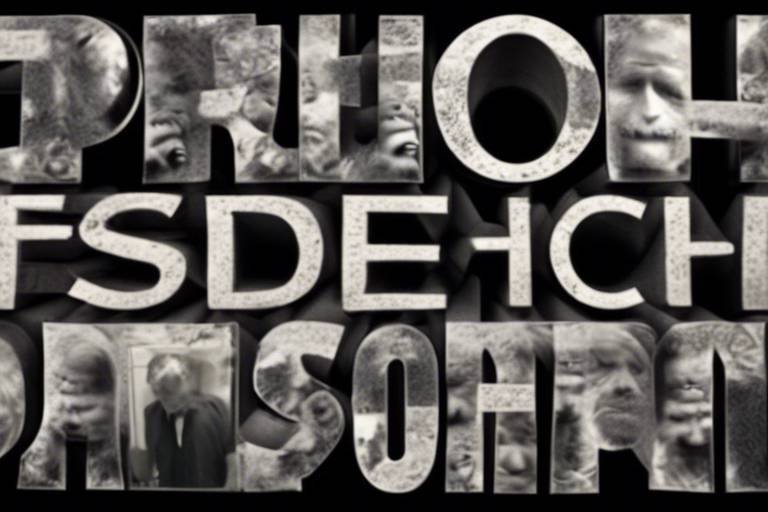Philosophy's Role in Ethical Governance and Politics
In an era where political landscapes are constantly shifting and ethical dilemmas abound, understanding the foundational role of philosophy in governance is more crucial than ever. Philosophy provides the bedrock upon which ethical governance is constructed, influencing how leaders make decisions that affect the lives of millions. But what does this really mean? Well, think of philosophy as the compass that guides politicians through the murky waters of public service. It helps them navigate complex issues, ensuring that their choices not only aim for the greater good but also respect individual rights and justice.
At its core, ethical governance is not just about following rules; it’s about embodying principles that promote justice, equity, and the public good. Philosophical theories serve as a framework for leaders, offering insights into what constitutes ethical behavior and decision-making. Whether it’s the utilitarian approach that seeks to maximize happiness or the deontological perspective that emphasizes duty, philosophy shapes the very fabric of political discourse. This interplay between philosophy and politics is not merely academic; it has real-world implications that can shape societies and influence the course of history.
Moreover, as we delve deeper into the nuances of ethical governance, we encounter various philosophical theories that offer different lenses through which to view political actions. For instance, utilitarianism prompts leaders to consider the consequences of their actions, urging them to prioritize policies that yield the greatest benefits for the most people. On the other hand, deontological ethics reminds them that there are moral imperatives that must be upheld, regardless of the outcomes. This tension between different ethical frameworks creates a dynamic environment where leaders must constantly evaluate their choices and their impact on society.
In essence, philosophy serves as a guiding light in the often chaotic realm of politics. It encourages leaders to reflect on their values, question their motives, and consider the broader implications of their decisions. By grounding their practices in philosophical principles, politicians can foster a culture of accountability and transparency, ultimately leading to a more ethical governance structure. As we explore the various philosophical theories that influence political ideologies, we will uncover the profound impact they have on shaping policies and, by extension, the lives of citizens.
Ethical governance is rooted in philosophical principles that guide leaders in making decisions that benefit society. This section discusses various philosophical theories that underpin ethical practices in governance.

The Foundations of Ethical Governance
Ethical governance is not just a buzzword; it’s a vital framework that ensures leaders make decisions that resonate with the values and needs of society. At its core, ethical governance is rooted in philosophical principles that provide a moral compass for leaders. Imagine a ship sailing through turbulent waters; without a compass, it risks going off course. Similarly, without a solid philosophical foundation, governance can easily veer into unfairness and corruption.
One of the primary philosophical theories that underpin ethical governance is social contract theory. This theory posits that individuals consent, either explicitly or implicitly, to form a society and accept certain moral and political obligations. Think of it as a mutual agreement among citizens and their leaders: in exchange for security and order, citizens agree to abide by the laws and regulations set forth. This foundational idea emphasizes the importance of accountability and transparency in governance, as leaders are expected to act in the best interests of the people they serve.
Another significant philosophical influence is utilitarianism, which advocates for actions that maximize overall happiness. In the realm of governance, this means that decisions should be made based on their potential to create the greatest good for the greatest number. However, this principle can be a double-edged sword. While it encourages leaders to consider the broader impact of their decisions, it may also lead to the neglect of minority rights. Hence, ethical governance must strike a balance between collective welfare and individual rights.
Moreover, deontological ethics, which focuses on the inherent morality of actions rather than their consequences, plays a crucial role in shaping ethical governance. This theory emphasizes that certain actions are morally obligatory, regardless of their outcomes. For instance, a leader might be faced with a decision that could benefit the majority but involves dishonest practices. Deontological ethics would argue that the integrity of the decision-making process is paramount, advocating for honesty and transparency even if it means sacrificing short-term gains.
To further illustrate these philosophical foundations, consider the following table that summarizes key theories and their implications for ethical governance:
| Philosophical Theory | Core Principle | Implications for Governance |
|---|---|---|
| Social Contract Theory | Mutual agreement between citizens and leaders | Accountability and transparency are essential |
| Utilitarianism | Maximizing overall happiness | Decisions should consider the greater good |
| Deontological Ethics | Moral obligation regardless of outcomes | Integrity and honesty in decision-making |
In conclusion, the foundations of ethical governance are deeply intertwined with philosophical principles that guide leaders in their decision-making processes. By understanding and applying these theories, leaders can better navigate the complexities of governance, ensuring that their actions align with the values of justice, integrity, and the public good. As we explore further, it becomes clear that these philosophical underpinnings are not merely academic; they are essential for fostering a political environment where ethical governance thrives.
- What is ethical governance? Ethical governance refers to the principles and practices that guide leaders in making decisions that are fair, just, and in the best interest of society.
- How do philosophical theories influence governance? Philosophical theories provide frameworks that help leaders evaluate the moral implications of their decisions, ensuring accountability and transparency.
- Why is utilitarianism important in governance? Utilitarianism emphasizes the importance of maximizing overall happiness, encouraging leaders to consider the broader impact of their policies.
- What role does deontological ethics play in governance? Deontological ethics focuses on moral obligations, advocating for integrity and honesty in decision-making processes.

Philosophical Theories Influencing Politics
When it comes to the intricate dance of governance and politics, philosophical theories serve as the underlying rhythm that guides leaders and policymakers in their decision-making processes. These theories are not just abstract concepts; they are the bedrock upon which political ideologies are built, influencing everything from legislation to public policy. Imagine a world where every political decision is informed by a deep understanding of ethical principles; this is the promise of integrating philosophy into politics.
At the core of political philosophy, we find three major theories: utilitarianism, deontology, and virtue ethics. Each of these frameworks offers unique insights into how we can approach governance ethically, yet they also present their own sets of challenges and dilemmas. For instance, utilitarianism advocates for the greatest good for the greatest number, pushing leaders to consider the outcomes of their decisions on the overall happiness of society. However, this approach can sometimes overlook the rights of individuals, leading to ethical quandaries.
On the other hand, deontological ethics emphasizes the importance of duty and moral rules. This perspective insists that certain actions are inherently right or wrong, regardless of the consequences. In a political context, this means that leaders must adhere to ethical standards even when it might be politically advantageous to do otherwise. This approach fosters integrity and accountability within political systems, creating a framework where justice is prioritized over expedience.
Virtue ethics, meanwhile, shifts the focus from rules and outcomes to the character of the individuals in power. It posits that ethical governance is rooted in the moral virtues of leaders themselves. This approach encourages the cultivation of traits such as honesty, courage, and empathy, which are essential for fostering public trust. When leaders embody these virtues, they not only make better decisions but also inspire others to engage in ethical behavior.
To illustrate how these philosophical theories manifest in real-world politics, consider the following table that summarizes their key features and implications:
| Philosophical Theory | Key Features | Political Implications |
|---|---|---|
| Utilitarianism | Focus on outcomes, maximize happiness | Policies aimed at collective welfare |
| Deontology | Emphasis on duty, moral rules | Integrity and accountability in governance |
| Virtue Ethics | Focus on character, moral virtues | Trust and ethical leadership |
In conclusion, the influence of philosophical theories on politics cannot be overstated. They provide the tools necessary for leaders to navigate the murky waters of governance, enabling them to make decisions that not only serve the public good but also uphold ethical standards. As we continue to grapple with complex political issues, understanding these philosophical underpinnings will be crucial in shaping a more just and equitable society.
- What is the main purpose of integrating philosophy into politics?
Integrating philosophy into politics aims to ensure that political decisions are guided by ethical principles, leading to more just and equitable governance. - How does utilitarianism affect political decision-making?
Utilitarianism affects political decision-making by encouraging leaders to prioritize policies that maximize overall happiness and welfare for the greatest number of people. - What role does virtue ethics play in leadership?
Virtue ethics plays a crucial role in leadership by emphasizing the importance of character and moral virtues, which fosters public trust and ethical governance.

Utilitarianism in Political Decision-Making
Utilitarianism, a philosophical theory primarily associated with Jeremy Bentham and John Stuart Mill, advocates for actions that promote the greatest happiness for the greatest number. In the realm of political decision-making, this approach serves as a guiding principle for leaders who aim to create policies that maximize overall welfare. Imagine a political landscape where every decision is weighed against its potential to enhance collective happiness; this is the core of utilitarian thought. However, the application of utilitarianism in governance isn't as straightforward as it might seem.
One of the key aspects of utilitarianism is its focus on outcomes. Politicians often face dilemmas where they must choose between options that benefit the majority but may harm a minority. For instance, consider a government deciding whether to build a new highway that will improve transportation for thousands while displacing a small community. Here, the utilitarian calculus involves evaluating the trade-offs: the overall benefits of improved infrastructure versus the costs of displacing families. Such scenarios highlight the need for careful consideration and ethical deliberation in political decisions.
Moreover, utilitarianism encourages a data-driven approach to policy-making. Governments can utilize cost-benefit analyses to assess the potential impacts of their decisions. By quantifying happiness or welfare, leaders can make informed choices that reflect the desires and needs of their constituents. For example, a city council might analyze the effects of a new public park, weighing the joy it brings to the community against the financial costs involved in its creation. This method not only promotes transparency but also fosters public trust in governance.
However, it's essential to recognize the limitations of utilitarianism in political contexts. Critics argue that an overemphasis on the majority's happiness can lead to the neglect of individual rights. Imagine a society where the majority can dictate the fate of the minority simply because their happiness is prioritized. This raises profound ethical questions about justice and equity. Hence, while utilitarianism provides a robust framework for evaluating policies, it must be balanced with other ethical considerations to ensure that all voices are heard and respected.
To illustrate how utilitarianism operates in practice, let's examine a few case studies:
| Policy | Utilitarian Analysis | Outcome |
|---|---|---|
| Universal Healthcare | Increases overall health and well-being of the population. | Improved public health metrics, but higher taxes. |
| Public Transportation Expansion | Reduces traffic congestion, benefits commuters. | Increased accessibility, but displacement of some residents. |
| Carbon Tax Implementation | Encourages reduction in carbon emissions for a healthier planet. | Long-term environmental benefits, short-term economic burden. |
These examples showcase the practical implications of utilitarian thinking in political decision-making. While the intention behind such policies is to promote the greater good, the outcomes often spark debates about fairness and justice. Therefore, it's crucial for political leaders to engage in ongoing dialogues with their constituents to navigate these complex ethical waters.
In conclusion, utilitarianism plays a significant role in shaping political decisions, but it is not without its challenges. As leaders strive to balance the happiness of the majority with the rights of the minority, they must remain vigilant and open to incorporating diverse ethical perspectives into their governance strategies. By doing so, they can foster an environment where not only the greatest happiness is pursued but also where justice and equity are upheld.

Challenges of Utilitarian Ethics
Utilitarianism, while a compelling framework for ethical decision-making, is not without its challenges and criticisms. One of the primary concerns revolves around the potential for utilitarian principles to overshadow individual rights. Imagine a scenario where the happiness of the majority is prioritized at the expense of a minority's well-being. This raises a critical question: is it justifiable to sacrifice one person's rights for the greater good? Such dilemmas highlight the tension between collective welfare and individual justice.
Moreover, utilitarian ethics can sometimes lead to morally questionable outcomes. For instance, consider a government that decides to implement a policy that benefits the majority but harms a vulnerable group. This situation can create a slippery slope where the ends are used to justify unethical means. As a result, critics argue that utilitarianism may inadvertently endorse actions that are fundamentally unjust, simply because they produce a net increase in happiness.
Another challenge is the difficulty in accurately measuring happiness and welfare. What constitutes "the greatest good" can vary significantly among individuals and cultures. This subjectivity complicates the application of utilitarian principles in policy-making. For example, a decision that enhances economic prosperity might not necessarily translate to improved quality of life for all citizens. Thus, policymakers often grapple with conflicting interests and values, making it challenging to achieve a consensus on what actions truly benefit society.
Furthermore, the focus on outcomes can lead to a neglect of the processes involved in decision-making. Ethical governance should not only consider the results but also the means by which those results are achieved. If a policy generates positive outcomes but is implemented through coercive or deceptive methods, can it still be deemed ethical? This dilemma underscores the importance of integrating other ethical frameworks, such as deontology, which emphasizes moral duties and rights, into discussions of governance.
In summary, while utilitarianism provides a useful lens for evaluating the consequences of actions in governance, it is essential to be aware of its limitations. The potential for injustice, the challenges of measuring happiness, and the need for ethical processes are critical factors that require careful consideration. Balancing the greater good with individual rights is a complex endeavor, and policymakers must navigate these challenges thoughtfully to foster a just and equitable society.
- What is utilitarianism? Utilitarianism is an ethical theory that suggests that the best action is the one that maximizes overall happiness or utility.
- What are the main criticisms of utilitarianism? The main criticisms include the potential neglect of individual rights, difficulties in measuring happiness, and the risk of justifying unethical actions for the sake of the greater good.
- How can utilitarianism be applied in governance? Utilitarianism can guide policymakers to consider the outcomes of their decisions, aiming to achieve the greatest benefit for the largest number of people.
- Can utilitarianism coexist with other ethical theories? Yes, integrating utilitarianism with deontological ethics and virtue ethics can provide a more comprehensive approach to ethical governance.

Case Studies of Utilitarian Policies
Utilitarianism, with its core tenet of maximizing overall happiness, has been a guiding principle in various political policies around the globe. One of the most notable case studies is the implementation of universal healthcare in countries like Canada and the United Kingdom. These nations adopted a system that aims to provide medical services to all citizens, regardless of their financial status. The underlying philosophy here is that by ensuring access to healthcare, the overall well-being of the population increases, leading to a healthier society and, ultimately, a more productive workforce.
Another compelling example can be found in environmental policies aimed at combating climate change. Countries such as Sweden have implemented carbon taxes as a means to reduce greenhouse gas emissions. This policy is rooted in utilitarian thought, as the government believes that the long-term benefits of a healthier planet outweigh the immediate economic burden on industries. By investing in sustainable practices, they aim to enhance the quality of life for future generations, showcasing the utilitarian approach to governance.
However, it's essential to recognize that while the utilitarian framework often appears beneficial, it can lead to complex ethical dilemmas. For instance, consider a hypothetical scenario where a government decides to allocate more resources to a popular public park, believing it will enhance community happiness. While this may indeed benefit many, it could come at the expense of funding for vital services like education or public safety, raising questions about the moral implications of prioritizing collective enjoyment over individual rights.
To better understand the impact of utilitarian policies, we can look at a comparative analysis of two different approaches:
| Policy | Utilitarian Outcome | Criticism |
|---|---|---|
| Universal Healthcare | Increased overall health and productivity | Potential for long wait times and resource allocation issues |
| Carbon Tax | Reduction in emissions, promoting sustainability | Economic strain on certain industries and job losses |
In conclusion, while utilitarianism provides a framework for evaluating the effectiveness of policies based on collective happiness, it is crucial to balance these decisions with considerations for individual rights and justice. The real-world implications of these policies often reveal the intricate dance between the greater good and the ethical responsibilities of governance. As we continue to explore the role of utilitarianism in political decision-making, we must remain vigilant about the potential pitfalls that can arise when the needs of the many overshadow the rights of the few.
- What is utilitarianism? Utilitarianism is a philosophical theory that suggests the best action is the one that maximizes overall happiness or well-being.
- How does utilitarianism influence political policies? Utilitarianism informs political decisions by emphasizing outcomes that benefit the majority, often guiding legislation on healthcare, environmental issues, and social welfare.
- What are the criticisms of utilitarian policies? Critics argue that utilitarian policies can overlook individual rights and lead to ethical dilemmas when the needs of the majority infringe upon the rights of minorities.
- Can you provide examples of utilitarian policies? Examples include universal healthcare systems and carbon taxes aimed at reducing emissions and promoting public health.

Deontological Ethics and Political Integrity
Deontological ethics, often associated with the philosophy of Immanuel Kant, is centered around the idea that actions are morally right or wrong based on their adherence to rules or duties rather than the consequences they produce. This principle is crucial in the realm of politics, where integrity and accountability are non-negotiable. When political leaders embrace deontological ethics, they commit to upholding certain moral standards that guide their decisions, regardless of the potential outcomes. This creates a framework where trust is fostered between the government and its citizens, as people can rely on their leaders to act in accordance with established ethical norms.
In practice, deontological ethics encourages politicians to prioritize their duties to the public. This means making decisions that align with ethical guidelines and legal standards, even if those choices may not yield the most popular or beneficial results in the short term. For instance, a politician might face pressure to pass a policy that benefits a specific interest group but would be detrimental to the broader community. A deontological approach would compel them to reject such a proposal, adhering to their duty to serve the public good instead.
Moreover, the application of deontological ethics in political integrity can be illustrated through various principles:
- Truthfulness: Politicians should commit to honesty in their communications, ensuring that their promises and statements reflect reality.
- Fairness: All citizens deserve equal treatment under the law, and leaders must act impartially to uphold justice.
- Respect for Rights: A commitment to protecting individual rights is paramount, ensuring that no one is unjustly treated for the sake of political expediency.
These principles not only enhance the ethical climate of governance but also serve as a bulwark against corruption and abuse of power. When leaders adhere to deontological ethics, they create a political environment where accountability thrives. Citizens are more likely to engage with their government and hold it accountable when they believe their leaders are committed to ethical principles.
However, the application of deontological ethics is not without its challenges. Politicians may find themselves in situations where their duties conflict, leading to ethical dilemmas. For example, a leader might have a duty to uphold the law while also feeling a moral obligation to provide assistance to those in need. Navigating such conflicts requires a nuanced understanding of ethical responsibilities and a commitment to finding solutions that honor both obligations.
In conclusion, deontological ethics plays a vital role in maintaining political integrity. By grounding their decision-making in moral duties and principles, political leaders can foster a culture of trust and accountability. As citizens witness their leaders acting ethically, public confidence in governance increases, paving the way for a more just and equitable society.
Q1: What is deontological ethics?
A1: Deontological ethics is a moral philosophy that emphasizes the importance of following rules and duties in determining the morality of actions, regardless of the consequences.
Q2: How does deontological ethics apply to politics?
A2: In politics, deontological ethics guides leaders to make decisions based on moral duties and principles, fostering integrity and accountability in governance.
Q3: What are some challenges of applying deontological ethics in politics?
A3: Challenges include navigating conflicts between different duties and responsibilities, which can lead to ethical dilemmas for political leaders.

The Role of Virtue Ethics in Leadership
When we think about leadership, what often comes to mind? Charisma, strategic thinking, or perhaps a strong vision? While these traits are undeniably important, the foundation of effective leadership lies in virtue ethics. This philosophical approach emphasizes the significance of moral character and virtues, shaping leaders who not only make decisions but also inspire trust and integrity within their communities. In an era where ethical lapses in leadership are frequently spotlighted, the role of virtue ethics becomes even more critical.
Virtue ethics, rooted in the teachings of philosophers like Aristotle, posits that the essence of a good leader is not just in their actions but in who they are as individuals. Leaders guided by virtue ethics strive to cultivate traits such as honesty, courage, and compassion. These virtues are essential for fostering an environment where ethical governance can thrive. Imagine a leader who embodies these qualities: they not only make decisions that benefit the public but also model behavior that encourages others to act ethically. This ripple effect can transform organizations and communities, leading to a more just society.
To understand the impact of virtue ethics on leadership, consider the following key aspects:
- Character Development: Leaders who focus on virtue ethics prioritize their moral development. They engage in self-reflection and seek to improve their character continuously. This commitment to personal growth is crucial in navigating complex ethical dilemmas.
- Trust Building: When leaders exhibit virtuous behavior, they foster trust among their constituents. Trust is the bedrock of effective governance; without it, policies and initiatives can falter. A leader who is viewed as honest and fair is more likely to gain the support of their followers.
- Long-term Vision: Virtue ethics encourages leaders to think beyond immediate gains. They focus on the long-term implications of their decisions, considering how their actions will affect future generations. This perspective is vital in creating sustainable policies that benefit society as a whole.
Moreover, cultivating virtuous leadership requires intentional effort. Organizations can implement training programs that emphasize ethical decision-making and character building. These programs should not just be theoretical; they should include practical scenarios that challenge leaders to apply their values in real-world situations. By doing so, leaders can develop the skills necessary to navigate the complexities of governance while adhering to ethical principles.
In addition to training, mentorship plays a pivotal role in developing ethical leaders. Experienced leaders can guide emerging leaders, sharing insights on how to maintain integrity in challenging situations. This mentorship creates a culture of accountability, where leaders are encouraged to uphold ethical standards and support one another in their journeys.
Ultimately, the impact of virtue ethics on public policy cannot be overstated. When leaders embody virtuous principles, their policies are more likely to reflect moral values that prioritize the common good. For instance, a leader who values compassion may advocate for policies that support marginalized communities, ensuring that everyone has a voice in the political arena. This approach not only enhances the quality of governance but also nurtures a sense of community and belonging among citizens.
In conclusion, the role of virtue ethics in leadership is indispensable. As we navigate an increasingly complex political landscape, the need for leaders who prioritize character and ethical decision-making has never been more urgent. By embracing virtue ethics, leaders can foster trust, inspire their communities, and create a legacy of ethical governance that stands the test of time.
- What is virtue ethics? Virtue ethics is a philosophical approach that emphasizes the importance of moral character and virtues in ethical decision-making.
- How does virtue ethics influence leadership? Leaders guided by virtue ethics focus on cultivating moral virtues, which helps build trust and integrity within their communities.
- Why is character important in leadership? A strong character allows leaders to navigate ethical dilemmas effectively and inspires confidence among their followers.
- Can virtue ethics be taught? Yes, virtue ethics can be taught through training programs, mentorship, and practical applications that focus on ethical decision-making.

Developing Ethical Leaders
In today's complex political landscape, the need for ethical leaders has never been more pressing. Developing individuals who can navigate the murky waters of governance with integrity and moral clarity is crucial for the health of any democracy. But how do we cultivate such leaders? The journey begins with a robust framework of education and training that emphasizes not just the *what* of leadership, but the *why* behind it. Ethical leaders are not born; they are made through deliberate effort and commitment to moral principles.
One effective strategy in developing ethical leaders is through experiential learning. This approach allows aspiring leaders to engage in real-world scenarios where they can practice decision-making in ethically challenging situations. For instance, internships in public service or community organizations can provide invaluable insights into the ethical dilemmas leaders face daily. By confronting these challenges firsthand, future leaders can better understand the implications of their choices and the importance of prioritizing the public good over personal gain.
Moreover, mentorship plays a pivotal role in shaping ethical leaders. Experienced leaders can guide novices through the intricacies of political life, sharing lessons learned from their own experiences. This relationship fosters an environment where ethical considerations are not just theoretical concepts but practical realities. Mentors can help emerging leaders navigate difficult decisions, reinforcing the idea that ethical leadership is a continuous journey rather than a destination. The following table outlines key components of effective mentorship programs:
| Component | Description |
|---|---|
| Regular Meetings | Consistent check-ins to discuss ethical dilemmas and decision-making processes. |
| Feedback Mechanisms | Constructive criticism to help mentees refine their ethical reasoning. |
| Real-World Exposure | Opportunities to observe ethical leadership in action. |
| Skill Development | Workshops and training sessions focused on ethical decision-making. |
Another essential aspect of developing ethical leaders is fostering a culture of accountability. When leaders are held responsible for their actions, it reinforces the idea that ethical behavior is non-negotiable. This culture can be cultivated through transparent processes and open communication within organizations. For example, implementing regular ethics training and discussions can help instill a sense of responsibility among leaders. Furthermore, organizations can establish clear codes of conduct that outline expected behaviors, ensuring that ethical considerations are integrated into everyday practices.
Ultimately, the goal of developing ethical leaders is to create a pipeline of individuals who prioritize integrity and the common good. This effort requires collaboration between educational institutions, political organizations, and the community at large. By investing in the ethical development of leaders, we not only enhance governance but also build a more just and equitable society.
- What is the importance of ethical leadership in politics? Ethical leadership is vital in politics as it promotes trust, accountability, and transparency, which are essential for a healthy democracy.
- How can mentorship improve ethical leadership? Mentorship provides guidance and support, helping aspiring leaders navigate ethical dilemmas and learn from experienced individuals.
- What role does education play in developing ethical leaders? Education equips future leaders with the knowledge and skills necessary to make informed and ethical decisions in governance.
- Why is accountability important for ethical leaders? Accountability ensures that leaders are responsible for their actions, reinforcing the expectation of ethical behavior in governance.

Impact of Virtue Ethics on Public Policy
When we talk about virtue ethics, we’re diving into a world where character and moral virtues take center stage. This philosophical approach emphasizes the importance of what kind of people we should be, rather than merely focusing on the rules we should follow or the consequences of our actions. In the realm of public policy, this perspective can have profound implications. It encourages leaders to cultivate qualities such as honesty, integrity, and compassion, which ultimately shape the policies they create and implement.
Imagine a political leader who embodies virtues like justice and empathy. Such a leader is more likely to create policies that prioritize the well-being of the community, rather than just ticking boxes to meet certain metrics. For instance, when crafting policies related to education, a virtuous leader would consider not just the funding but also the holistic development of students, ensuring that their emotional and social needs are met alongside academic achievements.
Moreover, virtue ethics can lead to a more trustworthy government. When leaders act from a place of moral integrity, the public is more likely to trust their decisions and motives. This trust is crucial for effective governance, as it fosters a cooperative spirit between the government and its citizens. Policies that emerge from virtuous leadership often reflect the values and aspirations of the community, making them more relevant and accepted by the public.
To illustrate this impact, consider the following table that outlines how virtue ethics can influence various aspects of public policy:
| Aspect of Public Policy | Virtue Ethics Influence | Outcome |
|---|---|---|
| Healthcare | Emphasis on compassion and care | Policies that prioritize patient well-being and equitable access |
| Education | Focus on character development | Programs that foster social-emotional learning alongside academics |
| Environmental Policy | Commitment to stewardship | Legislation that protects natural resources for future generations |
As we can see from the table, the influence of virtue ethics on public policy can lead to more comprehensive and humane approaches. However, it is important to note that merely having virtuous leaders is not enough. There must also be systems in place that encourage and support ethical behavior within political institutions. This can include transparent decision-making processes, accountability measures, and community engagement initiatives.
In conclusion, the impact of virtue ethics on public policy is significant. It encourages leaders to prioritize moral considerations, which can lead to policies that genuinely benefit society. As we continue to navigate complex social issues, fostering virtuous leadership will be essential in creating a just and equitable world.
- What is virtue ethics? Virtue ethics is a philosophical approach that emphasizes the importance of character and moral virtues in determining ethical behavior.
- How does virtue ethics influence public policy? It encourages leaders to prioritize moral values, leading to policies that reflect community needs and ethical considerations.
- Can virtue ethics improve trust in government? Yes, when leaders act with integrity and moral character, it fosters greater public trust in their decisions and policies.
Frequently Asked Questions
- What is the significance of philosophy in ethical governance?
Philosophy plays a crucial role in ethical governance as it provides the foundational principles that guide leaders in making decisions for the greater good. It helps in forming the moral compass that directs policies and practices, ensuring that they align with societal values and promote justice.
- How do different philosophical theories affect political decision-making?
Different philosophical theories, such as utilitarianism, deontology, and virtue ethics, significantly shape political ideologies. For instance, utilitarianism focuses on maximizing overall happiness, while deontology emphasizes duty and moral rules. These frameworks influence how policies are formulated and the ethical considerations behind them.
- What are the challenges associated with utilitarian ethics in governance?
While utilitarianism aims for the greater good, it can lead to challenges, particularly regarding the rights of individuals. Critics argue that prioritizing collective welfare may overlook justice and fairness for minority groups, raising ethical dilemmas in decision-making processes.
- Can you provide examples of utilitarian policies in real-world governance?
Absolutely! Examples include public health policies that prioritize vaccination programs to achieve herd immunity, or economic policies that aim to maximize overall welfare by redistributing resources. These case studies highlight how utilitarian principles can be applied to address societal issues effectively.
- What role does deontological ethics play in maintaining political integrity?
Deontological ethics emphasizes the importance of duty and moral obligations, which are vital for maintaining integrity in political systems. By adhering to established moral rules, leaders can foster accountability and trust, ensuring that their actions align with ethical standards.
- How can virtue ethics enhance ethical governance?
Virtue ethics focuses on the character and moral virtues of leaders. By cultivating virtues such as honesty, courage, and empathy, leaders can enhance ethical governance, build public trust, and create policies that reflect the moral values of the community.
- What strategies can be used to develop ethical leaders?
Training and education are essential for developing ethical leaders. Strategies may include mentorship programs, ethical decision-making workshops, and fostering an environment where moral discussions are encouraged. These approaches help in shaping leaders who prioritize ethical considerations in their governance.
- How does virtue ethics influence public policy formulation?
Virtue ethics influences public policy by ensuring that ethical considerations are at the forefront of legislative decisions. Policies that reflect moral values contribute to community well-being and promote a culture of integrity and responsibility among leaders and citizens alike.



















